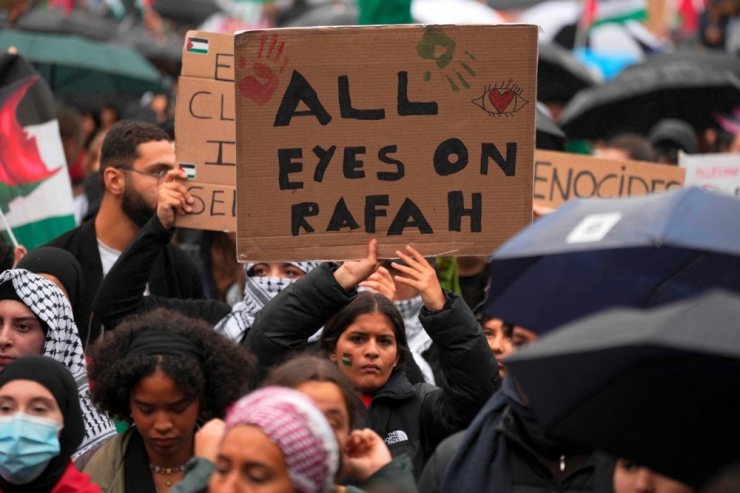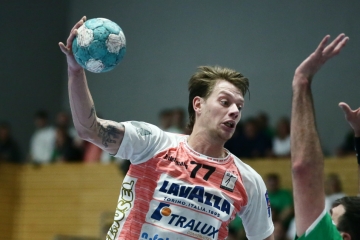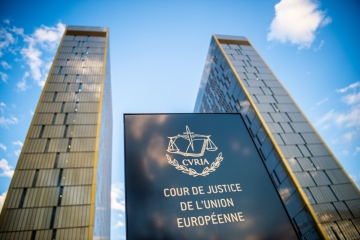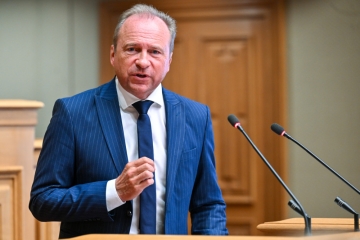Schülerartikel / Marc Botenga: „International law is invoked when it’s convenient and forgotten when it’s not convenient“

All over the world, protesters are standing up for Palestinians
Understanding the Israel-Palestine conflict can feel like trying to solve a puzzle without all the pieces. It’s complex, it’s messy, and it’s filled with layers of history and politics. To help make sense of what is happening right now, I sat down with Marc Botenga, a Belgian politician and member of the European Parliament, who has himself called for a ceasefire. Known for his dedication to human rights and global justice, Botenga provided valuable insights that can help unravel this long-standing dispute. In our conversation, we tackled some tough questions: What’s really happening between Israel and Palestine? Why does it matter? And what can we do about it? By digging deep into the issues, Botenga offered a clearer picture of the conflict and why it’s so important to understand it correctly.
Marc Botenga: People keep forgetting what is happening in Gaza because the international media doesn’t mention it as much anymore. They gave the Russian-Ukraine war, as an example, way more prominence and coverage than Palestine. The media plays a big part in today’s generation on how people get informed, and if there is nothing written about certain events, people tend to forget about them. The lack of coverage is also one of the reasons why so many people have spoken about the Israel-Palestine conflict in a very confusing way for many years. Like you could read that it’s a war between Arab and Jewish populations or, more often, between Muslim and Jewish people, which is not the case because there are also Christian Palestinians losing their houses for example, or progressive Jewish organisations opposing Israeli policies. It’s also not a conflict between two equal parties. It’s one colonizing power that’s stealing the land from the other. People say it’s a very difficult conflict to understand, while actually, it’s not. It’s one state, the state of Israel, stealing the land through illegal settlements from Palestinians.
So does media play a part in this „conflict“?
Yes they do, there’s a responsibility for politicians, for the international media. They have not given this situation, this drama, this colonization and this occupation the media attention it deserves.
Can we really call it a conflict or war, though?
As the MEP said himself, a war is generally a war between two armed forces. But what we are seeing here is not a war between Hamas and Israel, as the media may sometimes describe it, it’s a massacre, an ethnic cleaning campaign and, as the International Court of Justice has said, with the risk of genocide. So when you see hospitals and schools being bombed in Gaza, it’s something different from a war. If you look at the victims, the massive number of civilian victims, it looks more like a massacre, like ethnic cleansing, than war. But not just in Gaza, also in Jerusalem and the West Bank.
Now, would it be different if it were another country than Palestine?
Well, if you look at Ukraine, you already have the answer. The European Union considers Israel an ally, because Israel does the „dirty job“ for the West very often. Israel bombs Lebanon and Syria, and there are Israeli missiles hitting Iraq. These attacks often serve the West’s interests. Not the Western population at large, but the ruling classes of the West. And there is a large amount of support for Israel. On the other hand, they want to incorporate Ukraine into the European sphere of influence. Because of that, they support Ukraine. But all of these settings have little to do with international law. International law is something that is invoked when it’s convenient. And is forgotten when it’s not convenient. And that is what we are seeing right now. But the problem is that Israel will not listen to a call for a ceasefire. So what we need to do is force a ceasefire! We need to make Israel obey international law, as they are violating one hundred United Nations resolutions in perfect impunity. We need to take measures, since only through them will Israel obey international law. Israel has killed Palestinian children in perfect immunity for the last years, not just since October 7th, 2023. There is anger and disappointment among those who have been speaking about human rights, international law since, when it came to Ukraine, politicians were speaking up about it. But when it comes to Palestine, those people are perfectly happy with bombing and with children being killed. The European Union and European countries are still allowing weapons from their territory to go to Israel, even now after 15,000 children have been killed. The US and the UK, as well as some European countries, are still actively supporting Israel. So what we are now seeing are Western double standards. Our political system and our government are on the wrong side of this, and there are people who cannot speak up about Palestine because they might lose their jobs. But at the same time, from Bolivia to Indonesia and from Spain to Belgium and to the Czech Republic, we have seen so many people go out demonstrating, and the movement now in the United States is amazing. We are seeing all those people, from different religious backgrounds, standing up for what’s right, standing up for Palestinians. Hope in humanity comes from these demonstrations. It’s important to keep hope, if we show that we can organize and mobilize, we can make a difference. We can force our governments to listen to us and make this world a better place.
- EU-Parlament gibt grünes Licht für von der Leyens Kommission - 27. November 2024.
- Eine Person lebensgefährlich verletzt – Experten ermitteln, Straße bleibt noch gesperrt - 27. November 2024.
- Sandy Artuso macht mit „Queer Little Lies“ Esch zum queeren Kultur-Hotspot - 26. November 2024.



 Headlines
Headlines




 Umfrage
Umfrage
 Facebook
Facebook  Twitter
Twitter  Instagram
Instagram  LinkedIn
LinkedIn
Sie müssen angemeldet sein um kommentieren zu können.
Melden sie sich an
Registrieren Sie sich kostenlos